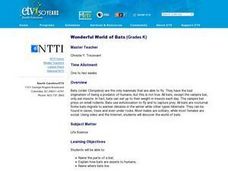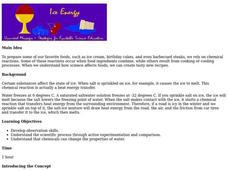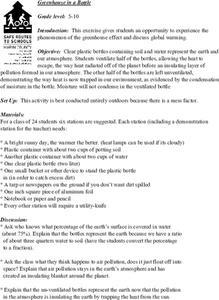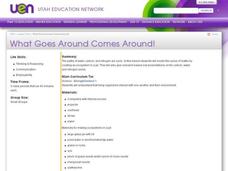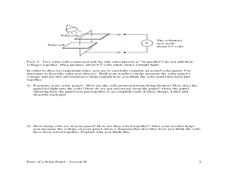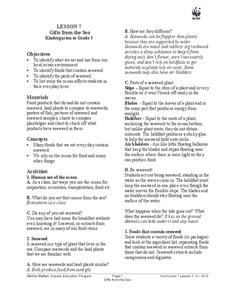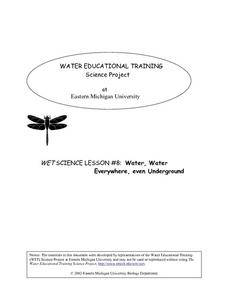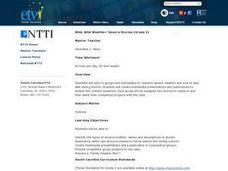Curated OER
Wonderful World of Bats
Students create a book about bats. They write a letter to a scientist containing questions about bats. They compare the socialization of bats to humans; compare the needs of bats to humans and other animals.
Curated OER
Ice Energy
Students investigate how salt affects the state of ice. In this ice cream making lesson, students change the freezing temperature by adding salt and observing the results. Students use experimentation and comparison to see how chemicals...
Curated OER
Rice Farming
Third graders investigate how farmers get more rice from their land. For this farming lesson, 3rd graders discover things that farmers to do produce more rice. Students study photosynthesis and illustrate pictures about it. Students test...
Curated OER
The Wonders of Bacteria
Young scholars explore the evolution and features of bacteria through a series of activities. In this biology lesson, students collect data and graph bacterial growth. They design a brochure about bacteria's role in society.
Peace Corps
Weather and Water in Ghana
Students investigate the climate of their region. Students research statistics and conduct interviews. Students take a virtual tour of Ghana and discuss its climate. Students consider water conservation and the role it plays in both...
Curated OER
Greenhouse in a Bottle
Students create models of the greenhouse effect using recycled 2-liter bottles. They discuss how their models compares to the real greenhouse effect the earth experiences.
Curated OER
What Goes Around Comes Around!
Learners create an ecosystem in a jar to show a model of the water, carbon, and nitrogen cycle. Working in small groups, they research and present orally the information they find on this cycle.
Curated OER
What Is Happening To My Species?
Students select and research an animal that lives in the rainforest of Manu, Peru. They watch and discuss a video, create masks and costumes to role-play various rainforest animals, conduct research, and write a short story of their...
Curated OER
The Greening of Mars: The Changes Necessary to Sustain Life on Mars
Fifth graders discuss the currents conditions on the planet of Mars. In groups, they work together to develop a mechanism that allows for a balanced ecosystem to survive on the planet. After presenting their ideas to the class, they...
Curated OER
Solar Racing
Students harness the power of the sun to design, construct and evaluate a solar-powered model car of their creation. They race their cars in a "Solar Sprint" race modeled after the National Renewable Energy Laboratory's Junior Solar...
Curated OER
"Five Little Seeds"
Fourth graders complete various activities related to the plant life cycle. They read the book "The Tiny Seed," read and discuss the poem "Five Little Seeds," complete a "Plantenstein Mystery" and other online activities, write and...
Curated OER
Where is Agriculture?
Students explore agriculture. In this agriculture lesson, students read "Where is Agriculture?" and discuss all the things that come from agriculture. Students discuss what they need to survive and give examples of agricultural products...
Curated OER
What Are the Layers of the Rain Forest?
Students investigate the different levels of the rain forest by comparing it to an apartment. In this ecology lesson plan, students practice using forest related vocabulary words and complete a vocabulary data sheet. Students...
Curated OER
Gas Laws and Alka-Seltzer Rockets
Students investigate the Ideal Gas Law. In this three states of matter lesson, students create Alka-Seltzer rockets using film canisters. Students record observations and data according to the scientific method and explain the gas...
Curated OER
Parts of a Solar Panel-Part II
Students discover how a mini-solar panel is constructed by behaving like detectives. Students examine an actual solar panel, measure the solar panel's voltage and use drawings to describe what they observe before completing questions...
Curated OER
Basics of Archaeology
Students identify what and how to complete an Archaeological excavation is conducted. They identify the transition from one layer to the next more easily if the colors of the layers are different. When creating a dig, the teacher...
Curated OER
Gifts from the Sea
Students discover the oceanic food chain. In this healthy eating lesson, student investigate the fish we eat and the food the fish eat. Students discover what ocean animals eat seaweed and what everyday foods we eat that also...
Curated OER
Gifts from the Sea
Students investigate parts of the ocean. In this seaweed lesson, students identify foods that contain seaweed, parts of seaweed, and how the ocean affects our lives. As a class students brainstorm ways we rely on the ocean and compare...
Curated OER
The Greenhouse Effect
Eighth graders research the Greenhouse Effect on the Internet. They use a variety of sources and take notes on the topic. They use ClarisWorks to type a report, use spellcheck, proof and edit. They can create a class bulletin board.
Curated OER
Butterfly Lifecycles
What a great way to present this topic! While a little difficult to follow, this lesson plan provides great ideas for a second grade lesson plan involving butterfly lifecycles. Learners make drawings of butterflies, discuss life cycles,...
Curated OER
Water, Water Everywhere, Even Underground
The "Engage" section of a wetlands lesson plan asks young ecologists to examine a wetlands poster. You can easily find one online and display it using a projector. Pupils immerse a piece of sandstone and a piece of granite in water to...
Curated OER
How Does Climate Affect Plant Growth?
First graders compare plant samples obtained from two different sites to explore how climate affects plants.
Curated OER
Mercury Emissions: "Cap and Trade" Game
Students identify the role of government in protecting the environment, and participate in a game where they run a profitable or unprofitable power plant in changing market conditions. They summarize the pros and cons of emissions credit...
Curated OER
Wild, Wild Weather: Severe Storms
Second graders research dangerous weather and how they can stay safe. In this environment lesson, 2nd graders view video clips and research the Internet to identify the different types of severe weather storms. Students complete a...
